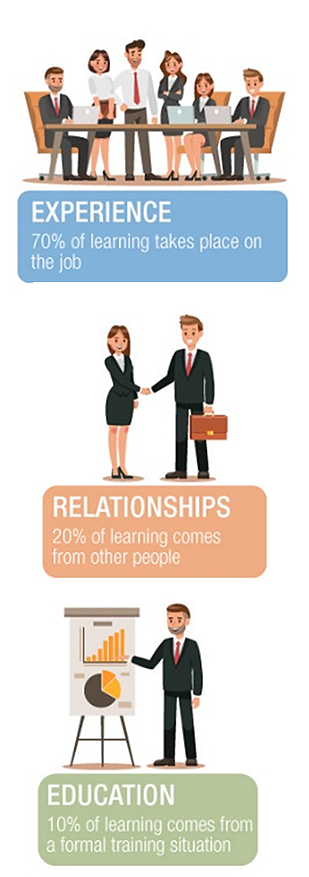theplaycompany designs learning experiences with innovative and multidimensional approaches, based on experience design and Gamification theories. In addition, we add our small hopes of making every trainees’ experience a fun, surprisingly positive experience that they will remember. Every experience stimulates meta-cognition and empathy, which leads to change and growth through interaction. We firmly believe therefore, that a strategic design of learning experience will really open a new world that has never existed before. This philosophy and belief that may seem at first naïve has in effect become our core way of thinking and way of working – starting from our first content development more than ten years ago, which continues on today.
Gamification
The American educational theorist John Dewey is well-known for saying that “An ounce of experience is better than a ton of theory” and established that knowledge is constructed through relationships and experiences. 702010, a contemporary paradigm-shifting theory from English academic Charles Jennings and Dutch consultant Jos Arets, also explains how “Learning happens 10% through education, 20% through coaching or conversations with others, and 70% through actual experiences.”


Then how should we approach experience design? the/playcompany utilizes gamification theory to effectively design the “specific experience” phase of the LXD process. Gamification by definition means the use of game elements and game design techniques in non-game contexts. This means that what is actually not a game can be enjoyed as if it were a game, and also that every step of the interaction and results are pre-designed strategically. With the rise of interactive media and diversification of individual motivation experiences in relation to game mechanics, gamification has already become widespread in corporate marketing and TV programs – therefore, without knowing, Gamification has already become a familiar part of our daily lives.
Combining traditional educational environments with Gamification elements to increase motivation and improve learning effect – the “Gamification of Education” – has therefore already been in the spotlight on a global level. In 2014, the biggest HRD conference in the world, ATD, focused on Gamification as a core new educational content development method agenda, and in 2017 multiple seminars at ATD focused on success and failure case studies of Gamification in education – highlighting the fact that Gamification has already secured its positioning as the core next generation pillar of education development.
LXD through Gamification has following advantages:
First, proactivity. Within gamified content, every trainee must make their own decisions for their next action in each phase. This of course initiates in-depth cognitive immersion and problem solving, and the data driven from this process and result act as excellent stimuli for meta-cognition, reflection and discussion.
Second, immersion. Unlike traditional training, Gamification content maximizes training effect through the trainees’ proactive participation and immersion. The “fun” aspect inherent in every game, which lets the participants to even feel like the time flies by, even tends to create a positive organizational dynamic change. In comparison, the common lecture-style training feels relatively boring as a result.
Third, diversity. Gamification content which is created based on the core game principle of “Diversity” always yields different processes and results – which enables the trainees to witness diverse creative cases and also simultaneously learn from their mistakes. This is because it is a fictional simulation, where one can always try again and keep practicing.
Based on these advantages, we must now evolve learning experience to a virtuous cycle: trainee characteristic-based intrinsic motivation increase, natural maximization of proactive participation, and interaction between trainees and reflection that leads to a real learning-by-doing experience. We are standing now at a crossroads, where education must also be upgraded to the next level. We firmly believe that gamification theory will play a significant role on this route to our next evolution.
theplaycompany
add. 06222 6F Arena Bld., 425, Eonju-ro, Gangnam-gu, Seoul, Korea tel. 82 2 545 7234 fax. 82 2 545 6230 mail. info@theplaycompany.co.kr
Corporate registration number. 592-86-00430 CEO. Yoon Jung Kang
© 2022 theplaycompany all rights reserved
theplaycompany
add. 06222 6F Arena Bld., 425, Eonju-ro, Gangnam-gu, Seoul, Korea
tel. 82 2 545 7234 fax. 82 2 545 6230
mail. info@theplaycompany.co.kr
Corporate registration number. 592-86-00430
CEO. Yoon Jung Kang
© 2022 theplaycompany all rights reserved
